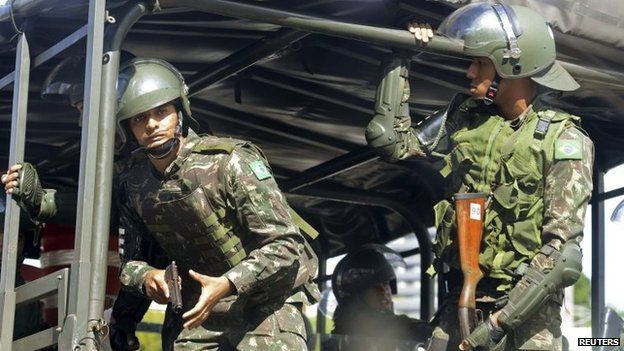Brazil police strike ends in Bahia amid troop deployment
- Published

Police in the state of Bahia in north-eastern Brazil say they have voted to end a two-day strike over pay after accepting an improved government offer.
They said they accepted salary increases ranging from 25% to 60%, according to Brazil's G1 news portal.
On Wednesday, elite police units and armed soldiers were deployed to the state to restore order amid a hike in the number of murders and other crimes.
Shops were also looted in the capital, Salvador, following the walkout.
Brazil's third-largest city is due to host six matches during the football World Cup, which begins in June.
Following their vote to end the walkout, the protesting officers were seen on local TV celebrating what they said was a "victory".
Their decision came a day after a federal judge ruled the dispute illegal and ordered the striking officers to return to work or their union would face fines.
'Unacceptable'
State officials said 39 people have been killed in and around Salvador since the strike was announced, a much higher figure than normal.
The labour dispute also prompted car robberies and looters to pillage supermarkets, electronics stores and other shops, as police stayed away in defiance of the court order.
Many shops, schools and universities remained closed, and fewer buses circulated in Salvador after drivers refused to go to work for fear of being attacked.
The troop deployment to the state had been authorised by President Dilma Rousseff to "guarantee peace in Bahia".
"It is unacceptable that the security of Bahia's population be at risk," she said on Twitter.
It was not the first strike by police in Salvador.
In 2012, troops were also sent on to the streets during a police walkout that lasted 12 days and led to a spike in murders and other violent crimes.
Back then, more than 130 people were killed and 12 officers were arrested, including the leader of the latest labour dispute, Marco Prisco.
Some three million people live in Salvador, making Bahia one of the most populous states in Brazil.
The costal city also has one of the highest murder rates in the country.
- Published16 April 2014
- Published15 April 2014
- Published8 February 2012